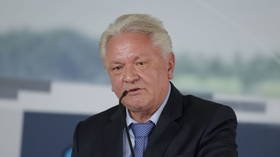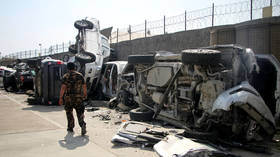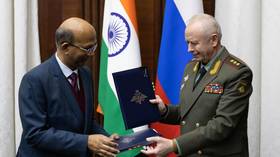What travel advice would the State Department give tourists visiting violent America?
From the outside looking in, the situation in the US looks volatile. The actual violence and the potential for more has led some to suggest that if it was anywhere else, the State Department would be issuing travel warnings.
The Pittsburgh synagogue shooting and bombs being mailed to opponents of President Donald Trump, they’re both terrible events, but they’re just the headlines of the last few weeks. No one could seriously suggest they are particularly out of the ordinary.
Just over a year ago, a maniac gunman opened fire from a Las Vegas hotel room killing dozens below – but the attacks in Vegas and now Pittsburgh (to choose just two) are mere bookends to a whole series of mass shootings, some of which barely even make it into the headlines, so commonplace have they become.
The febrile political atmosphere and the regular violence aren’t exactly enticing for nervous travellers, and while the US State Department can’t offer advice about visiting its own country, other countries are issuing warnings of their own.
The advice tends to be in understated diplomatic vocabulary, but is often quite telling.
Canada warns that: “Demonstrations occur and have the potential to suddenly turn violent. Avoid all demonstrations and large gatherings, follow the instructions of local authorities and monitor local media.”
Germany’s advice to its nationals heading to America says: “There are more frequent political demonstrations throughout the United States. There is also an increased risk of politically motivated violence. It is therefore recommended, especially in urban centers, to follow the news situation closely and to avoid demonstrations on a large scale.”
The debate within the US right now is not about how to stop an isolated tragedy from happening again; it’s more of an angry blame game. Left blames right, right blames left, everyone blames Russia or China, and no one takes responsibility.
Front page of @washingtonpost right now. The United States would be issuing travel warnings against countries with this kind of violence and instability. pic.twitter.com/h4EJy7ecHJ
— Kate Woodsome (@kwoodsome) October 27, 2018
The left make accusations against Donald Trump, as if violence hadn’t been invented before he came to office, as if his presidency isn’t in some way a symptom rather than a cause. No one is suggesting Trump’s rhetoric is doing anything to dissuade more extreme behavior, but the left’s reaction to Trump is just as dangerous.
Meanwhile, the right refuses to act on issues like gun control, or to rein in extreme elements of its support, and instead seems to revel in the chance to indulge in the kind of nationalistic speech which has brought electoral success to the Republicans.
However, with the anti-Semitic slaughter in Pittsburgh, who can blame who for that? Because it’s pretty clear that both left and right have issues with anti-Semitism.
And then there is the specter of Russia, which has been the center of the blame game because it is such a convenient scapegoat, so useful when it comes to misdirection in the national political debate, and so reliable an excuse not to face up to your own political challenges.
How often have you heard about the Russian social media campaigns which are designed to cause tensions in society? This is such an easy way to pass the buck.
Here is the State Department’s advice about travelling to Russia: “Terrorist groups continue plotting possible attacks in Russia. Terrorists may attack with little or no warning, targeting tourist locations, transportation hubs, markets/shopping malls, and local government facilities. Bomb threats against public venues are common.
U.S. citizens are often victims of harassment, mistreatment, and extortion by law-enforcement and other officials.”
Does that description remind you of anywhere else?
The question for the US is now, who is going to step up, stop blaming others and accept some responsibility for what’s happening in a society that is suffering some extremely dangerous divisions, the kind that might have tourists thinking twice?
Like this story? Share it with a friend!















